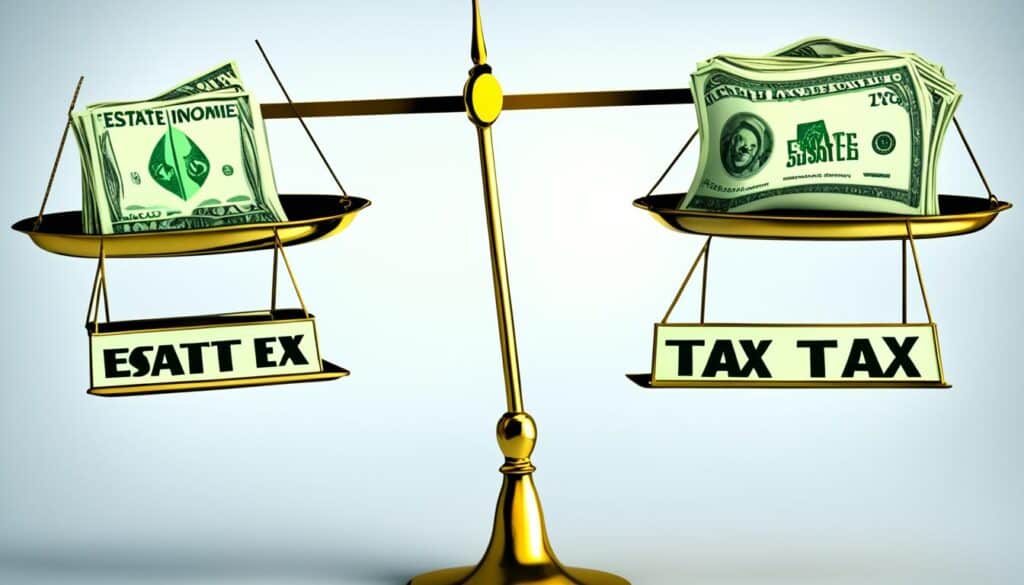Are estate planning fees tax deductible? This question has been on the minds of many individuals seeking to save on their tax expenses while planning for the future. The answer, however, is not as straightforward as one might think.
In the past, estate planning fees were eligible as an itemized deduction under IRS rules. But with the implementation of the Tax Cuts and Jobs Act, the deductibility of these fees has undergone significant changes. So, where do we stand now? Do estate planning fees still hold the potential for tax savings? Let’s dive deeper to uncover the truth.
Key Takeaways:
- Under the new tax law, most estate planning fees are no longer tax deductible.
- However, small business owners may still be able to deduct fees related to business succession planning.
- Legal fees for the creation and management of a trust, as well as fees related to the collection and filing of estate taxes, may also be deductible.
- Consult with a tax attorney or expert to navigate the complex landscape of estate planning deductions.
- Stay updated on the latest IRS rules and guidelines to maximize your tax savings.
Understanding the Previous IRS Rules
Under the previous IRS rules, certain estate planning fees were deductible as miscellaneous deductions on Schedule A. These fees had to be directly related to the production or collection of income, the maintenance, conservation, or management of income-producing property, or tax advice or planning. This allowed individuals to deduct fees for services such as advice on income-generating instruments or the use of property transfer methods. However, the Tax Cuts and Jobs Act changed these rules, eliminating the deduction for most estate planning fees.
It’s important to note that estate planning fees relating to the simple transfer of property or guardianship, as well as the use of estate planning instruments like wills, powers of attorney, and living wills, were generally not deductible even before the tax changes.
| Estate Planning Expenses | Tax Deductibility |
|---|---|
| Fees directly related to the production or collection of income | Previously deductible, but no longer |
| Fees for maintenance, conservation, or management of income-producing property | Previously deductible, but no longer |
| Tax advice or planning fees | Previously deductible, but no longer |
| Fees for the simple transfer of property or guardianship | Not deductible |
| Fees related to the use of wills, powers of attorney, and living wills | Not deductible |
Exceptions and Tips for Deducting Estate Planning Fees

While it’s true that most estate planning fees are no longer tax deductible, there are still some exceptions and tips to help you navigate the complexities of deducting these expenses. Let’s take a closer look at the options available:
Small Business Owners and Business Succession Planning
If you’re a small business owner, there’s a silver lining. Fees related to business succession planning can still be deducted. Whether you’re transferring ownership or planning for the future, this deduction can provide some relief when it comes to estate planning lawyer fees and other related expenses.
Legal Fees for Trust Creation and Management
Creating and managing a trust is an important aspect of estate planning. The good news is that the fees associated with legal services for trust creation and management may still be deductible. These services can include drafting trust documents, administering trust assets, and ensuring your wishes are carried out effectively.
Collection and Filing of Estate Taxes
When it comes to estate taxes, seeking professional help is crucial. The fees associated with the collection and filing of estate taxes may also be eligible for a deduction. Whether it’s calculating the taxable estate, preparing the necessary forms, or representing your estate in tax matters, these expenses can be considered in your overall estate planning deductions.
Keeping Records and Meeting IRS Guidelines
If you meet the criteria for deducting estate planning expenses, it’s important to have proper documentation. Invoices from your attorney should clearly state the tax-deductible services provided. Remember that the IRS has a 2% floor on miscellaneous deductions, meaning the total fees deductible must exceed 2% of your adjusted gross income. Pay attention to this threshold and keep accurate records to ensure you’re maximizing your deductions while staying compliant with IRS guidelines.
Consultation with a Tax Professional
Estate planning fees and tax deductions can involve complex calculations. To ensure you’re taking full advantage of the deductions available to you, it’s highly recommended to consult with a tax attorney or expert. They can provide personalized guidance based on your specific circumstances, help you navigate the ever-changing IRS rules, and maximize your estate planning deductions.
| Deductible Expenses | Non-Deductible Expenses |
|---|---|
| Legal fees for business succession planning | Fees for the simple transfer of property or guardianship |
| Legal fees for trust creation and management | Fees related to the use of estate planning instruments like wills, powers of attorney, and living wills |
| Fees related to the collection and filing of estate taxes | Legal fees for general financial or personal advice |
Remember, while the majority of estate planning fees may not be tax deductible, exploring these exceptions and following the guidelines outlined can help you in maximizing your deductions. Stay informed about any new developments in IRS rules and regulations, as changes in tax laws could potentially impact the deductibility of estate planning fees.
The Impact of the Tax Cuts and Jobs Act
The Tax Cuts and Jobs Act brought about significant changes to the deductibility of estate planning fees. Previously, certain fees were eligible for deductions as miscellaneous expenses on Schedule A. However, under the new tax laws, most estate planning fees are no longer deductible, making it more challenging to save on taxes through these deductions.
This change has far-reaching implications for individuals who relied on deducting estate planning fees to reduce their tax burden. It’s crucial to explore alternative tax-smart estate planning tools and strategies to navigate the new landscape. One such option is donor-advised funds, which not only provide tax benefits but also allow you to support causes close to your heart.
To ensure you make informed decisions and optimize your estate planning in light of the new laws, it is advisable to consult with a financial advisor or tax expert who can provide personalized guidance tailored to your specific circumstances.
Remember, even without the tax deduction for estate planning fees, the value of having a solid estate plan in place cannot be overstated. It provides protection and peace of mind for you and your loved ones, enabling you to control the distribution of your assets and ensure your wishes are respected.
Consider the following table for a comparison of deductibility before and after the tax changes:
| Types of Estate Planning Fees | Previous Deductibility | Current Deductibility |
|---|---|---|
| Legal fees for estate tax planning services | Allowed if incurred for income production or conservation of income-producing property | Generally not deductible |
| Legal fees for business succession planning | Deductible for small business owners | Still deductible for small business owners |
| Fees related to the creation and management of trusts | Deductible | May still be deductible |
| Fees related to the collection and filing of estate taxes | Deductible | May still be deductible |
In summary:
The tax changes brought by the Tax Cuts and Jobs Act have limited the deductibility of estate planning fees. While this may impact your tax planning strategies, it’s essential to focus on the broader goals of estate planning and explore alternative tax-smart options. Consult with professionals to navigate the new laws and ensure your estate plan continues to align with your financial objectives.
Understanding Estate Planning Deductions for Beneficiaries

As a beneficiary of a trust or estate, it’s important to understand the limitations and possibilities for tax deductions that you may be eligible for. While there are some deductions available, they come with certain conditions and exceptions.
Claiming Deductions
One type of deduction that beneficiaries may be able to request is for financial or capital losses. If you have experienced losses in investments or other financial assets, you may qualify for a deduction that can help offset your overall tax liability. However, it’s crucial to carefully document and report these losses to ensure compliance with IRS guidelines.
While deductions for financial or capital losses are available, there are limitations on deductions for charity contributions. If your charity contributions exceed your gross income, you may not qualify for a deduction. It’s important to consult with a tax professional to understand the specific rules and regulations relating to deductions for charity contributions as a beneficiary.
Estate Administration Fees
Another aspect to consider as a beneficiary is estate administration fees. Trustees, executors, or personal representatives who handle the administration of the estate can typically claim deductions for these fees. However, it’s important to note that these deductions are considered taxable ordinary income.
To illustrate the potential tax implications of estate administration fees, here is a table summarizing the deductibility and tax treatment:
| Fee Type | Deductible | Tax Treatment |
|---|---|---|
| Estate Administration Fees | Yes | Taxable Ordinary Income |
Consulting a Tax Professional
It’s important to note that the conditions for claiming deductions as a beneficiary are still under review by the IRS. Tax laws and regulations can change over time, and it’s essential to stay updated and consult with a tax professional who specializes in estate planning and taxation. They can provide personalized guidance on maximizing your deductions and navigating the complexities of the tax code.
In conclusion, understanding the estate planning deductions available to beneficiaries is crucial for optimizing tax savings. From claiming deductions for financial or capital losses to considering the tax treatment of estate administration fees, it’s important to consult with a tax professional and stay informed about IRS guidelines. By taking advantage of available deductions, you can mitigate your tax liability and ensure the most efficient management of your financial resources.
The Difference Between Estate Tax and Estate Income Tax

When it comes to taxes related to estates, there are two types that often cause confusion: estate tax and estate income tax. Understanding the difference between these two taxes is essential for effective estate planning. Let’s dive into the details:
Estate Tax
Estate tax is a tax imposed on the cumulative assets of an individual after their death. It is calculated based on the total value of the assets left behind by the deceased person. Estate tax laws and exemption amounts can vary, so it’s important to consult with a tax professional for the most up-to-date information.
This type of tax is not applicable to all estates. There is typically a minimum threshold, known as the exemption amount, below which estates are not subject to estate tax. For estates that exceed the exemption amount, estate tax rates can be significant. However, it’s worth noting that estate tax laws are subject to change and may differ from state to state.
Estate Income Tax
Estate income tax, on the other hand, is a tax on the income earned by the estate of a deceased individual. This tax applies to interest, dividends, and any other type of income generated by the estate after the decedent’s passing. It’s important to highlight that estate income tax is not an inheritance tax. Instead, it focuses on the income or profits received by the estate from property or investments.
If the decedent had established a trust, their representatives may have the option to file the estate and trust tax return together instead of separately. This election can simplify the tax filing process and potentially optimize tax savings. Consulting with an attorney or tax advisor experienced in estate planning can help guide you through this decision.
In summary, estate tax is a tax imposed on the total assets left behind by a deceased individual, while estate income tax applies to the income earned by the estate after the decedent’s passing. Both types of taxes have their own rules and exemptions, so it’s crucial to consult with a professional who can provide personalized guidance based on your specific circumstances.
| Estate Tax | Estate Income Tax |
|---|---|
| Imposed on cumulative assets after death | Applies to income earned by the estate |
| Varies based on estate value and exemption amount | Focuses on interest, dividends, and other income sources |
| Can be a significant tax burden depending on estate value | Income tax rates may vary depending on the estate’s income |
| Subject to change and varies by state | No direct impact on inheritance amounts |
Conclusion and Additional Considerations
In conclusion, the tax implications of estate planning fees have changed under the current tax laws in the United States. Unfortunately, estate planning fees are generally no longer tax deductible. However, there are still some exceptions and deductions that you can consider to maximize your deductions for estate planning expenses.
For small business owners, certain fees related to business succession planning may still be deductible. It’s crucial to consult with a tax professional or attorney who can guide you through the specific tax implications of your estate planning fees and help you explore alternative tax-smart estate planning tools.
Keep in mind the importance of keeping accurate records of your financial affairs and discussing potential deductions with your attorney early in the estate planning process. Moreover, stay informed about any future changes in the tax laws that may impact the deductibility of estate planning fees. By staying proactive and knowledgeable, you can make the most informed decisions regarding your estate planning expenses.








